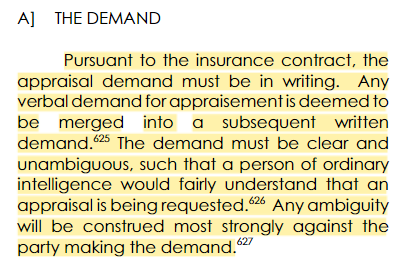[1.1] INTRODUCTION: THE APPRAISAL CLAUSE
Appraisal in today’s insurance landscape is characterized by traits necessary for the smooth and timely resolution of disputes. These characteristics include timeliness, independence of the panel, selection of appraisers, and confidentiality, which are some of the significant advantages of appraisal. Additionally, the process of appraisal has undergone substantial refinement to cater to the intricacies of complex insurance disputes.
In an interconnected world, parties involved in insurance disputes, particularly those spanning across borders, increasingly favor and incorporate appraisal as a method to settle disagreements arising from insurance contracts. The practice and procedure of appraisal have evolved to account for the particularities of the parties involved, the demands of the insurance industry, and the safeguards for fairness and public interest.
It is generally accepted that a large number of insurance disputes never reach legal counsel. It is expected that parties will endeavor to resolve disputes early on and continue with their businesses, rather than allowing them to escalate into protracted and costly battles requiring third-party intervention. As a result, it is now common for commercial and government entities to evaluate risks and develop mechanisms for early dispute evaluation and prevention, which includes all forms of alternative dispute resolution, with appraisal being one of them.
[1.2] DISPUTE RESOLUTION MECHANISMS
The procedures available for dispute resolution cover a broad spectrum and can be categorized as either interest-based or rights-based. In an insurance setting, parties might consider these two options; whether to resolve the dispute in a way that aligns with the real interests of the parties, such as fairness and maintaining long-term relationships, or whether a more legalistic, rights-based approach should be taken.
In an interest-based approach, parties and the mediator can delve deep into the dispute to address the parties’ needs. This method isn’t confined to solutions based solely on the issues claimed by the parties and applying only the remedies available through the legal system. The focus here is on meeting the real needs of the parties, which can range from future business opportunities to better working conditions. It’s clear that there’s no one-size-fits-all method for resolving disputes.
When disputes arise, parties typically have three primary types of dispute resolution mechanisms to consider: (1) litigation in courts, the traditional statutory means of dispute resolution; (2) appraisal, aimed at achieving a final and enforceable outcome; and (3) other Alternative Dispute Resolution (ADR) mechanisms such as adjudication, conciliation, expert determination, mediation, and more. These methods resolve mature disputes through the intervention of a third party with substantial formal or informal authority over the parties.
[1.3] APPRAISAL AS AN ALTERNATIVE
Appraisal stands apart from other non-binding ADR techniques. The function of an appraisal panel is not to determine the easiest resolution to the dispute, but to determine responsibility for the dispute based on the evidence and cases put before it. At its most basic level, appraisal is the submission of a dispute to an independent non-governmental decision-maker, selected by or for the parties, to render a binding decision resolving a dispute in line with neutral, adjudicatory procedures that give the parties an opportunity to be heard.
While disputes must be settled rapidly, formal dispute resolution proceedings often do not align with this objective. This has led to organized forms of appraisal within many business organizations, chambers of commerce, exchanges, and trade associations. As national courts clear case backlogs, and set up special courts to determine commercial disputes, such as the Singapore International Commercial Court, the advantage of speed that appraisal once possessed will diminish. However, the commercial community retains its inclination towards appraisal over courts to settle their disputes due to advantages that appraisal retains, such as choice of forum, a neutral panel whose qualifications can be tailored to suit the dispute, confidentiality and global enforceability.
Appraisal represents an alternative to the judicial process. It is one of the methods appropriate for resolving complex disputes between the parties, particularly where points of law are involved. In the 21st century, the courts are seen as powerful allies of appraisal rather than as jealous controllers of its power. This relationship plays an important role in facilitating trade, foreign investment, and economic development.
[1.4] SCOPE OF THE APPRAISAL
This document focuses on appraisal, where disputes are resolved by private appraisal panels selected by the parties, as opposed to referring a dispute to a court. The decisions issued by the appraisal panel are binding on the parties, have the force of law, and can be enforced in court not only locally but also internationally. Such appraisal arises from an agreement between the parties at the stage when a contract is formed, or by a subsequent agreement between the parties after the dispute arises to submit the dispute to appraisal. It can also arise by means of a treaty obligation or statutory provision requiring the parties to resolve their dispute by appraisal.
This document covers three main areas: firstly, the decision of whether appraisal should be pursued in place of litigation and preserved by way of stays, injunctions, and ousters of jurisdiction; secondly, the procedure and other practical matters such as the appointment and remuneration of the appraisal panel, and the commencement and conduct of an appraisal; and thirdly, the decision, the rights of enforcement, and the opportunities to challenge.


